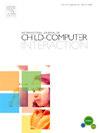通过一种有趣的方式来对待自闭症谱系障碍儿童的严肃游戏
Q1 Social Sciences
International Journal of Child-Computer Interaction
Pub Date : 2025-06-18
DOI:10.1016/j.ijcci.2025.100750
引用次数: 0
摘要
最近的巴西学校调查显示,儿童早期教育中自闭症谱系障碍(ASD)学生的入学率不断上升,强调需要包容性工具来解决他们面临的独特挑战。患有ASD的儿童通常表现出执行功能(EFs)的缺陷,例如工作记忆、认知灵活性和抑制控制,这些对学习和自我调节至关重要。本研究旨在结合可用性要求(URs)和自闭症友好设计原则,开发和评估一款专门用于监测和刺激自闭症儿童ef的严肃游戏(SG)。游戏有三个活动——记忆、阴影匹配和绘画——旨在评估和增强EFs。一项案例研究涉及12名3至6岁的巴西儿童(6名患有自闭症,6名作为对照组),并得到了专业教育援助(SEA)的支持。使用治疗师支持的探索性数据分析(EDA)分析640个疗程的数据。研究结果显示,自闭症谱系障碍患者和对照组之间的EF表现存在显著差异,特别是在错误率、帮助请求和会话持续时间方面。这个游戏有效地吸引了自闭症儿童,保持了他们的参与和动力。SG作为一种全纳教育工具,有望促进自闭症儿童的EF发展。公开可用的数据集支持自适应技术的进一步研究。本文章由计算机程序翻译,如有差异,请以英文原文为准。
Towards serious games through a playful approach for children with autism spectrum disorder
Recent Brazilian school surveys highlight a growing enrollment of students with Autism Spectrum Disorder (ASD) in early childhood education, emphasizing the need for inclusive tools to address their unique challenges. Children with ASD often exhibit deficits in Executive Functions (EFs), such as working memory, cognitive flexibility, and inhibitory control, which are critical for learning and self-regulation. This study aims to develop and evaluate a Serious Game (SG) tailored to monitor and stimulate EFs in children with ASD, integrating usability requirements (URs) and autism-friendly design principles. The game features three activities – Memory, Shadow-matching, and Painting – designed to assess and enhance EFs. A case study involved 12 Brazilian children aged 3 to 6 years (6 with ASD and 6 as a control group), with support from Specialized Educational Assistance (SEA). Data from 640 sessions were analyzed using therapist-supported Exploratory Data Analysis (EDA). Findings reveal significant differences in EF performance between ASD and control groups, particularly in error rates, help requests, and session durations. The game effectively engaged children with ASD, maintaining their participation and motivation. The SG shows promise as an inclusive educational tool, fostering EF development in children with ASD. A publicly available dataset supports further research in adaptive technologies.
求助全文
通过发布文献求助,成功后即可免费获取论文全文。
去求助
来源期刊

International Journal of Child-Computer Interaction
Social Sciences-Education
CiteScore
7.20
自引率
0.00%
发文量
73
 求助内容:
求助内容: 应助结果提醒方式:
应助结果提醒方式:


